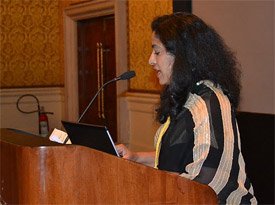On September 2, 2011, Christian leaders from across India gathered together in Bangalore in an unprecedented and historical meeting to discuss the issue of corruption particularly in the church. Named “Operation Nehemiah”, the meeting aimed to “bring together concerned senior Christian leaders in India to deliberate on the issue of corruption and to create a united movement with a vision to make the Indian Church corruption-free.” In attendance were about sixty leaders from the religious and business worlds representing the wide spectrum of Christian faith traditions in India . There were about 55 different churches and para-church organizations represented mostly from evangelical , pentecostal and other protestant backgrounds. Also representing the Catholic and Orthodox churches were several Archbishops and Bishops. The Lausanne Movement provided support and partnered in this endeavour.
The meeting took place in the midst of a national debate in India over corruption. While corruption is not new to political life in India, recent scams have raised the level of civil society awareness and anger about corruption. Massive public protests and a national campaign against corruption have shaken India in the last few months. There is a deep desire in the nation to free itself from this cancer. Operation Nehemiah responds to a belief that the church in India should be leading the way in this fight against corruption. Unfortunately, the church is seriously affected by corrupt leaders and practices. There is a large gap between our Lord’s vision of the church as salt and light and the reality of the church in India.
Operation Nehemiah was designed as an immersive hands-on workshop aimed at generating catalytic projects to deal with corruption. Two speakers set the context for the event: Dr. Manfred Kohl and Bishop Efraim M. Tendero, national director of the Philippine Council of Evangelical Churches. Dr. Kohl stressed that the priority was renewal within the church. Bishop Tendero outlined what is meant for the church to be “salt and light” in society. After the speakers, there was a time of corporate confession led by L.T. Jeyachandran, Asia Pacific executive director for Ravi Zacharias International Ministries. This was followed by a series of small group sessions in which participants discussed problems of corruption in the church and concrete remedies that could be taken. Each small group was challenged to come up with a specific project with short-term deliverables. Many proposed initiatives emerged concerning financial management of faith-based institutions, facilitating the reporting of corrupt behavior in faith-based institutions and dealing with reconciliation. Dr Roberto Laver, an international lawyer expert on governance issues, offered the closing remarks for the event.

“Operation Nehemiah” is an initiative by a small group of businessmen and professionals, known as the Transition Network led by Mr. Santosh Shetty. Their vision is “To bring about a transformation of Christian leaders through a restoration of integrity and righteousness that will reinstate their prophetic voice. This transformation can be achieved by, first, rediscovering and applying the biblical principles of servant leadership and stewardship and, secondly, by increasing awareness through advocacy, education, and interaction with Kingdom leaders from all spheres of life.” The initiative was actively supported by the Lausanne Movement which Partnered with Transition Networks to bring about the meeting. Grace Mathews, Vice-Chair of the Lausanne Movement participated in the meeting and stated in her concluding address that the “meeting was a clear expression of the Lausanne Covenant that calls for active social engagement. The Cape Town Commitment is likewise a clear call for all believers to be part of HIS church (practising Humility, Integrity and Simplicity). The Lausanne Movement believes in both proclamation as well as in incarnation of the Gospel which results in transformation of society. Our prayers are that this consultation will indeed result in both the renewal of the church in India as well as the transformation of society especially during this historic time in India.”

